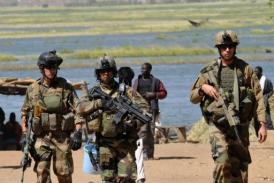
AFP- France is entering the final phase of its military intervention in Mali after a lightning advance that quickly exposed the weakness of Islamist rebels holding the country’s north, experts said.
But while the rebels may be on the run, they still pose a threat and much work remains to be done to flush them out of a vast cross-border desert region.
French forces on Wednesday entered Kidal, the last major town in their drive to rout Islamist fighters from northern Mali, days after the French-led capture of Gao and Timbuktu in a three-week offensive.
With the Islamists being driven from all their major strongholds, Paris is now hoping to wind down its intervention and hand the struggle over to African troops.
Experts said the speed of the French advance into Mali’s north — Kidal is nearly 1,500 kilometres (930 miles) northeast of the capital Bamako — has put paid to concerns that France was facing a potentially long and difficult battle against the rebels.
“Those who had exaggerated the Islamist danger in Mali were severely mistaken,” said Eric Denece, director of the French Centre for Intelligence Research, a think tank.
“After a few days of fighting they became aware of their weaknesses and hit the road,” he said.
Islamist groups took advantage of the chaos following a military coup in Bamako in March to seize the country’s north.
France swept to Mali’s aid on January 11 after the Islamists advanced south toward the capital, sparking fears the entire country would fall into their grasp and become a haven for extremist militants like Taliban-era Afghanistan.
Backed by air strikes and helicopter gunship raids, some 2,900 French troops were involved in the intervention, handling the bulk of the fighting alongside Mali’s own military.
“It is great tactical success for the French army to reach Kidal less than 20 days after the first air strikes, in an operation with enormous logistical distances and in coordination with the Malian army,” Denece said.
Military sources said the move into Kidal was aimed at keeping up momentum after the weekend’s successes in the north’s other main cities.
“Since the weekend and the reconquest of Gao and Timbuktu along the curve of the Niger river, we had the upper hand and had to keep it,” said a senior French officer, speaking on condition of anonymity.
Experts said France’s military role was now likely to diminish, though lack of cash and equipment has hampered the deployment of nearly 6,000 west African troops under the African-led force for Mali (AFISMA) that is expected to take over from the French army.
“After having taken the cities, we will now have to hold the ground and dislodge the… armed groups from this huge area, and that will be the role of the African forces,” said a former French intelligence official, speaking on condition of anonymity.
“We are entering the final phase,” French defence expert Pascal Le Pautremat said. “Now what is needed is to enter into negotiations with the Tuaregs, who are disposed to working with France and Mali.”
Ethnic Tuareg separatists from the Azawad National Liberation Movement (MNLA) initially fought alongside the Islamists but later broke away and offered to work with French forces.
Experts said the Tuaregs’ help could prove decisive in holding the north and keeping it out of the Islamists’ hands.
Le Pautremat said the Islamists had depots of arms and fuel in the desert and would prove difficult to hunt down, but that comparisons should not be made with Taliban strongholds in the high mountains of Afghanistan.
“With peaks rising to only 900 metres (under 3,000 feet) and the lack of deep valleys, this is not Afghanistan,” he said.
More important, experts said, is the rebels’ ability to move without difficulty across the region’s porous borders, making it easier for them to evade pursuers and obtain weapons and fuel.
“The real issue is the need for strong cooperation between different countries in the region — Mali, Chad, Niger and Algeria — in the fight against Islamist groups,” he said.

